Greenbelt, Maryland
Greenbelt is a city in Prince George's County, Maryland, United States, and a suburb of Washington, D.C.[1][2] Greenbelt is notable for being the first and the largest of the three experimental and controversial New Deal Greenbelt Towns, Greenbelt, Greenhills, Ohio, and Greendale, Wisconsin, planned and built by the Federal government.[7] The cooperative community was conceived in 1935 by Undersecretary of Agriculture Rexford Guy Tugwell, whose perceived collectivist ideology attracted opposition to the Greenbelt Towns project throughout its short duration.[8][7] The project came into legal existence in the spring of 1935. On April 8, 1935, Congress passed the Emergency Relief Appropriation Act of 1935.[9][8] Under the authority granted to him by this legislation, President Franklin D. Roosevelt issued an executive order, on May 1, 1935, establishing the United States Resettlement Administration (RA/RRA).[8]
Greenbelt, Maryland | |
|---|---|
.jpg) Roosevelt Center in March 2011. The city's commercial center typifies the Art Deco style used during the original construction of Greenbelt. | |
 Flag  Seal | |
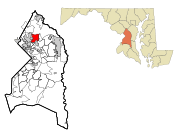 Location in Prince George's County and Maryland | |
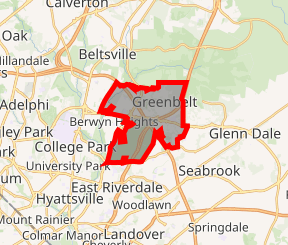
| |
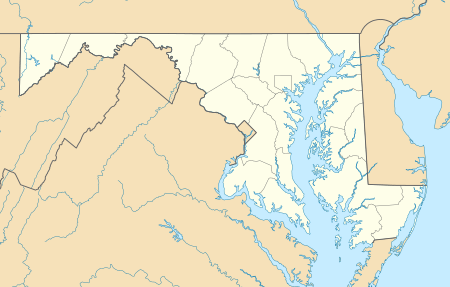 Greenbelt Location within the state of Maryland | |
| Coordinates: 38°59′41″N 76°53′07″W[1][2] | |
| Country | |
| State | |
| County | |
| Incorporated | June 1, 1937[3] |
| Government | |
| • Mayor | Colin Byrd (D) |
| Area | |
| • Total | 6.29 sq mi (16.29 km2) |
| • Land | 6.24 sq mi (16.15 km2) |
| • Water | 0.06 sq mi (0.14 km2) 0.99% |
| Elevation | 157 ft (48 m) |
| Population | |
| • Total | 23,068 |
| • Estimate (2019)[6] | 23,224 |
| • Density | 3,724.78/sq mi (1,438.26/km2) |
| Time zone | UTC−05:00 (Eastern) |
| • Summer (DST) | UTC−04:00 (Eastern) |
| ZIP Codes | 20770, 20771, 20768 |
| Area codes |
|
| FIPS code | 24-34775 |
| GNIS feature ID | 2390596 |
| Website | www |
Originally referred to as Maryland Special Project No. 1, the project was officially given the name Greenbelt when the Division of Suburban Resettlement of the Resettlement Administration began construction on January 13, 1936, approximately eight miles north of Washington.[7] The complete Greenbelt plans were reviewed at the White House by President Roosevelt and First Lady Eleanor Roosevelt on April 30, 1936.[7] The first tenants, after being selected through a stringent and restrictive application process, moved into the town, which consisted of structures built in the Art Deco, Streamline Moderne, and Bauhaus architectural styles, on September 30, 1937.[7]
Greenbelt is credited as a historic milestone in urban development, which includes its role as having served as the initial model for the privately constructed suburban Washington, D.C. planned cities of Reston, Virginia and Columbia, Maryland.[7]
Known locally as Old Greenbelt, the original, federally-built core of the city was recognized as the Greenbelt Historic District by the Maryland Historical Trust, and is listed on the National Register of Historic Places as a National Historic Landmark District.
Greenbelt's population, which includes residents of private sector dwellings that were constructed over several decades subsequent to the federal government's ownership of the city, was recorded as 23,068 in the 2010 U.S. Census.
Geography
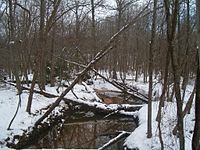
Greenbelt is located at 38°59′41″N 76°53′07″W.[1][2] According to United States Census Bureau data, as of January 1, 2018, the city has a total area of 6.23 square miles (16,146,235 square meters), of which 6.18 square miles (16,003,389 square meters) is land and 0.06 square miles (142,846 square meters) is water.[1][2] Greenbelt's ZIP Codes are 20770, 20771, and 20768. The ZIP Code 20770 contains all residential and business addresses that correspond to actual physical locations inside the geographic boundaries of the City of Greenbelt. The 20768 ZIP Code is assigned exclusively to post-office box (P.O. Box) addresses, while 20771 is the designated ZIP Code for Goddard Space Flight Center, situated on federal government owned land that is contiguous with a portion of Greenbelt's eastern border.[10][11]
NASA's Goddard Space Flight Center, located directly adjacent to Greenbelt's eastern boundary, utilizes a Greenbelt postal address (Greenbelt, MD 20768), as well. It is partially within the former Goddard census-designated place.[12][13]
Greenbelt Park, a unit of the National Park System, is located within the City of Greenbelt's boundaries, at its southernmost portion.
Transportation
_from_the_overpass_for_Cherrywood_Lane_in_Greenbelt%2C_Prince_George's_County%2C_Maryland.jpg)
Roads and highways
Two major highways pass through and have interchanges in Greenbelt: the Capital Beltway (I-95/I-495) and the National Park Service's owned and maintained portion of the Baltimore–Washington Parkway (unsigned MD 295). The Greenbelt portion of the Baltimore–Washington Parkway (B–W Parkway) is part of the parkway's 19-mile section which was listed on the National Register of Historic Places in 1991.[14]
Additionally, Greenbelt Road is part of state highway MD 193, which connects several suburban communities in both Prince George's and Montgomery counties. Kenilworth Avenue (MD 201) traverses Greenbelt in a north–south direction, running parallel to the B–W Parkway, providing an alternate travel route into Washington, D.C., from Greenbelt. The southernmost Maryland portion of Kenilworth Avenue forms a major interchange with both the B–W Parkway and US 50 near the Maryland–D.C. line, and continues into Washington, as the Kenilworth Avenue Freeway (DC 295).
Public transportation
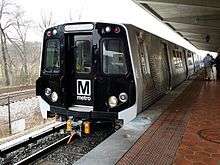
Washington Metro's rapid transit rail system serves Washington, D.C., and neighboring communities in Maryland and Northern Virginia, by operating 91 Metro stations, which includes the Greenbelt station, the northern terminus of Metro's Green Line. Commuter rail service to the station is provided by MARC Train's Camden Line, which connects the District of Columbia's Washington Union Station with Camden Station in Baltimore. The Camden Line provides service by utilizing the original 1835 Baltimore and Ohio Railroad (B&O) track route between Washington and Baltimore, now part of the CSX System.
Also available at the station, is a weekday express Metrobus service, the Greenbelt–BWI Thurgood Marshall Airport Express Line (commonly shortened to the Greenbelt–BWI Airport Line), designated route B30, to Baltimore/Washington International Thurgood Marshall Airport (BWI), a mode of transportation to and from the airport for airline passengers, in addition to allowing for connections to Baltimore's regional transit services.
Metrobus, Prince George's County's THE BUS (routes 11 and 15X), and the University of Maryland's Shuttle-UM (route 143; campus ID or pass required) each have bus routes which serve the city of Greenbelt.[15][16][17] Through a city–university partnership that began in 2017, Greenbelt residents are permitted to unlimited travel on Shuttle UM, with the purchase of a $10 annual pass.[18]
Bordering areas

- Beltsville Agricultural Research Center
- Berwyn Heights
- College Park
- Goddard
- Lanham
- New Carrollton
- Glenn Dale
History
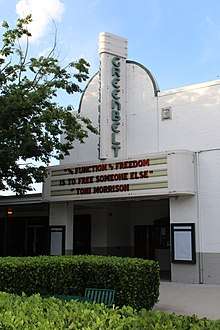
Greenbelt was settled on September 30, 1937, as a public cooperative community in the New Deal era.[7] The concept was at the same time both eminently practical and idealistically utopian: the federal government would foster an "ideal" self-sufficient cooperative community that would also ease the pressing housing shortage near the nation's capital. Construction of the new town would also create jobs and thus help stimulate the national economic recovery following the Great Depression.
Greenbelt, which provided affordable housing for federal government workers, was one of three Greenbelt Towns conceived in 1935, by President Franklin D. Roosevelt's Brain Trust member Rexford Tugwell, who was serving as the president's Undersecretary of Agriculture. The project was officially authorized in May 1935. First, on April 8, 1935, the United States Congress passed the Emergency Relief Appropriation Act of 1935. Then under the authority granted to him from this legislation, President Roosevelt issued an executive order, on May 1, 1935, establishing the United States Resettlement Administration (RA / RRA).[9][8] Rexford Tugwell agreed to serve as the Administrator of the Resettlement Administration, in addition to his Undersecretary of Agriculture position, without receiving any additional salary.[8]
Working alongside Tugwell was Charles W. Yost. The two other Greenbelt Towns are Greendale, Wisconsin (near Milwaukee) and Greenhills, Ohio (near Cincinnati). A fourth town, Roosevelt, New Jersey (originally called Homestead), was planned but was not fully developed on the same large scale as Greenbelt.[20][21]
Eleanor Roosevelt, wife of President Franklin D. Roosevelt, helped Tugwell lay out the Maryland town on a site that had formerly consisted largely of tobacco fields. She was also heavily involved in the first cooperative community designed by the federal government in the New Deal Era, Arthurdale, West Virginia, which sought to improve the lives of impoverished laborers by enabling them to create a self-sufficient, and relatively prosperous, cooperative community. Cooperatives in Greenbelt include the Greenbelt News Review, Greenbelt Consumers Coop grocery store, the New Deal Cafe, and the cooperative forming the downtown core of original housing, Greenbelt Homes Incorporated (GHI).[20]
The architectural planning of Greenbelt was innovative, but no less so than the social engineering involved in this federal government project.[22] Applicants for residency were interviewed and screened based on income and occupation, and willingness to become involved in community activities.[23] African-Americans were initially excluded, but were later included by the Greenbelt Committee for Fair Housing founded in 1963, and came to number 41% of residents, according to the 2000 census.[24][23][25] The same census data also indicates that African-Americans are isolated in certain parts within the town and the percentage of African-Americans within the historic area is often between 0% and 5% on most blocks.[26] Much of the federal government planned and developed portion of the city is located within the Greenbelt Historic District.
Greenbelt was the subject of the 1939 documentary film The City.
Demographics
| Historical population | |||
|---|---|---|---|
| Census | Pop. | %± | |
| 1940 | 2,831 | — | |
| 1950 | 7,074 | 149.9% | |
| 1960 | 7,479 | 5.7% | |
| 1970 | 18,199 | 143.3% | |
| 1980 | 17,332 | −4.8% | |
| 1990 | 21,096 | 21.7% | |
| 2000 | 21,456 | 1.7% | |
| 2010 | 23,068 | 7.5% | |
| Est. 2019 | 23,224 | [6] | 0.7% |
2010 census
During the census of 2010, there were 23,068 people, 9,747 households, and 5,367 families residing in the city.[5] The population density was 3,673.2 inhabitants per square mile (1,418.2/km2). There were 10,433 housing units at an average density of 1,661.3 per square mile (641.4/km2). The racial makeup of the city was 30.1% White, 47.8% African American, 0.3% Native American, 9.7% Asian, 0.1% Pacific Islander, 8.6% from other races, and 3.3% from two or more races. Hispanic or Latino of any race were 14.3% of the population.
There were 9,747 households, of which 31.0% had children under the age of 18 living with them, 30.7% were married couples living together, 18.3% had a female householder with no husband present, 6.0% had a male householder with no wife present, and 44.9% were non-families. 36.1% of all households were made up of individuals, and 7.3% had someone living alone who was 65 years of age or older. The average household size was 2.37 and the average family size was 3.12.
The median age in the city was 33.7 years. 22.8% of residents were under the age of 18; 10.1% were between the ages of 18 and 24; 34.4% were from 25 to 44; 25.3% were from 45 to 64, and 7.5% were 65 years of age or older. The gender makeup of the city was 46.7% male and 53.3% female.
2000 census
For the census of 2000, there were 21,456 people, 9,368 households, and 4,965 families residing in the city.[25] The population density was 3,586.6 people per square mile (1,385.3/km2). There were 10,180 housing units at an average density of 1,701.7 per square mile (657.3/km2). The racial makeup of the city was 39.7% White, 41.4% African American, 0.2% Native American, 12.1% Asian, 0.1% Pacific Islander, 3.1% from other races, and 3.5% from two or more races. Hispanic or Latino of any race were 6.5% of the population.
There were 11,202 households, out of which 26.9% had children under the age of 18 living with them, 33.1% were married couples living together, 15.0% had a female householder with no husband present, and 47.0% were non-families. 35.0% of all households were made up of individuals, and 5.8% had someone living alone who was 65 years of age or older. The average household size was 2.29 and the average family size was 3.00.
In the city, the population was spread out, with 21.9% under the age of 18, 12.5% from 18 to 24, 39.1% from 25 to 44, 19.8% from 45 to 64, and 6.7% who were 65 years of age or older. The median age was 32 years. For every 100 females, there were 91.8 males. For every 100 females age 18 and over, there were 88.2 males.
The median income for a household in the city was $46,328, and the median income for a family was $55,671. Males had a median income of $39,133 versus $35,885 for females. The per capita income for the city was $25,236. About 6.0% of families and 10.2% of the population were below the poverty line, including 12.7% of those under age 18 and 7.2% of those age 65 or over.
Government
The City of Greenbelt operates under a council-manager government as established by the city charter, the first such arrangement in Maryland.[22] The Council consists of seven members elected by plurality-at-large voting. From their members, the Council selects the Mayor and the Mayor Pro Tem (who assumes the duties of the Mayor when the Mayor is unavailable). The Council has traditionally chosen the member with the highest vote count to be Mayor and the member with the second-highest vote count as Mayor Pro Tem. Elections are held every two years, in odd-numbered years, in part to diminish the influence of political parties. Political party affiliations are not an official part of the city election process and are seldom part of candidate campaigns. Regular council meetings are held on Mondays, twice per month except during July, August, and December, when meetings are held once per month.[28]
The City Council is supported by 14 advisory boards and committees of citizen volunteers. The council appoints a professional city manager responsible for supervising government operations and implementing the policies adopted by the council.
The 2019 election selected the current city council:
- Mayor: Colin Byrd
- Mayor Pro Tem: Emmett Jordan
- Council Members: Judith "J" Davis, Leta Mach, Silke Pope, Edward Putens, and Rodney Roberts[29]
The council selects the City Manager:
- City Manager: Nicole Ard[30]
2009 election reform
Of the ten incorporated cities in Prince George's County, Greenbelt is one of three with at-large elections for council and mayor. (The others are District Heights and New Carrollton.) The remaining seven use combinations of districts and at-large voting. On 2008-02-28, the Maryland American Civil Liberties Union and Prince George's County NAACP sent a letter to the Greenbelt City Council claiming that Greenbelt's at-large system may violate section 2 of the Voting Rights Act of 1965.[31] According to the letter, the 2000 Census indicated that African-Americans constituted 38% of Greenbelt's voting-age population, Asians 13%, and Latinos 6%. At the time, however, all members of the city council were white. The letter proposed that the city switch to single-winner district-based voting, cumulative voting, or choice voting, and indicated a lawsuit would follow if no reform were implemented.[32] While the city population is racially diverse, only two African Americans had run for Council in the 30 years preceding the 2009 election, one of whom had withdrawn before the election.[33][34] In June 2008, the United States Department of Justice opened an investigation into the city's election system.[35]
In 2008, the city government hosted three public community meetings regarding election reform, in concert with the ACLU, NAACP, and FairVote.[36] Over 100 residents attended the forums, including one of the unsuccessful African American candidates, Jeanette Gordy, who said, "My concern is that people don’t get off their royal behinds. By going to meetings I got what I wanted and found out I had power as a citizen."[37]
In 2009, the city implemented several election reforms with the goal of increasing diversity: increasing the city council from five to seven members, adding another precinct in Greenbelt East to shorten voter lines, and amending the city charter to allow early voting.[38]
In the election held November 3, 2009, Emmett Jordan, an African American, was chosen by 75% of voters, electing him to the Council as Mayor Pro Tem, the second-highest city official.[39] [40] Voter turnout increased from 1,898 to 2,399 voters (a 26% increase in ballots cast) from 2007 to 2009.[41]
In the election held November 5, 2013, Emmett Jordan was chosen by 77% of voters, and receiving highest vote count was then elected Mayor by the council.[42][43]
County government
Prince George's County Police Department District 1 Station in Hyattsville;[44] District 2 Station in Brock Hall CDP, with a Bowie postal address;[45] and District 6 Station in Beltsville CDP serve the community.[46]
Federal government
- The United States Department of the Interior's National Park Service manages and operates Greenbelt Park.
- The United States Postal Service operates the Greenbelt Post Office.[47]
Greenbelt Historic District
The federally planned and constructed inner core of the city was designated as the Greenbelt Historic District by the Maryland Historical Trust, and subsequently placed on the National Park Service's maintained National Register of Historic Places on November 25, 1980. The historic district's status was elevated to National Historic Landmark District status on February 18, 1997. The district contains Roosevelt Center (originally named simply The Center, and later renamed in honor of President Roosevelt) and many buildings in the Art Deco style.[7] Roosevelt Center contains the Greenbelt Co-op Supermarket and Pharmacy (the Co-op), which opened in 1984, and the original, historic Old Greenbelt Theatre, while also adding the Greenbelt Arts Center (located underneath the Co-op, in what was previously the city's bowling alley), and additional new businesses such as the New Deal Cafe, with its name honoring the origins of its location.[7][48][49] Both the Co-op and the New Deal Cafe carry on a tradition from the city's inception, as they operate as non-profit cooperative membership corporations.[49][50][48][51]
Education
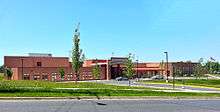
Greenbelt is served by Prince George's County Public Schools (PGCPS).[52][53]
There are three public elementary schools serving sections of Greenbelt:[54]
- Greenbelt Elementary School (Greenbelt),
- Magnolia Elementary School (unincorporated Prince George's County, Lanham address), and
- Springhill Lake Elementary School (Greenbelt).
All of Greenbelt is served by Greenbelt Middle School (Greenbelt),[55] which includes a Talented and Gifted magnet program.
All of Greenbelt is served by Eleanor Roosevelt High School (Greenbelt),[56] a highly rated school which includes a Science and Technology magnet program and an AP Capstone program.[57]
There is a public magnet school within the City:
- Dora Kennedy French Immersion School (Greenbelt), which serves K through 8th grade students. The school uses language immersion with instruction in the French language.
There is a public charter school within the City:
- Turning Point Academy (located within Greenbelt but using a Lanham mailing address), which serves K through 8th grade students using the Hyde process of character development. In March 2018, Prince George's County Public Schools announced that Turning Point Academy will be closed at the end of the 2018–2019 school year.
There are no private schools within the City of Greenbelt. There is a Catholic school in nearby Lanham CDP, Academy of Saint Matthias the Apostle.[58][59]
History of schools
The Lanham Act was used to build North End Elementary School.[60] The original Greenbelt High School building (later for Greenbelt Junior High/Greenbelt Middle) opened in c. 1937.[61] Originally, the Federal Works Agency controlled North End Elementary School, Greenbelt High School, and the Center School. High Point High School, in Beltsville, opened in fall 1954, and began serving students from Greenbelt. The former Greenbelt High School then became Greenbelt Junior High School. The county bought Center School for $260,000, after the federal government renovated it in July 1958. The county also bought Greenbelt Junior High and North End Elementary.[60] Roosevelt High was scheduled to open in fall 1976.[62] The new Greenbelt Middle School opened on August 20, 2012.[61]
Public libraries
Greenbelt is served by the Greenbelt Branch of the Prince George's County Memorial Library System.[63]
Notable people
- Abraham Chasanow
- Erin Harpe, lead singer of Erin Harpe & the Delta Swingers
- Isaiah Prince, offensive lineman for the Ohio State University and the Cincinnati Bengals.[64]
- Phyllis Richman, restaurant critic for The Washington Post from 1976 to 2000
- Dorothy Sucher, author
- Steve Rochinski, jazz guitarist, recording artist, composer/arranger, educator, and author — childhood home from 1955 to 1960
- Rosa Salazar, actor
- Joe Pug, musician
Economy
Top employers
According to Greenbelt's 2018 Comprehensive Annual Financial Report,[65] the top employers in the city were:
| Number | Employer | Employees |
|---|---|---|
| 1 | City of Greenbelt | 463 |
| 2 | Bozzuto Group | 460 |
| 3 | Eleanor Roosevelt High School | 350 |
| 4 | Burlington Stores, Inc. | 229 |
| 5 | Springhill Lake Hotel Partners, LLC | 148 |
| 6 | Paradyme Management Inc. | 134 |
| 7 | Martin's | 130 |
| 8 | Giant Food of Maryland, LLC | 126 |
| 9 | Greenbelt Middle School | 123 |
| 10 | ATA Aerospace, LLC | 116 |
Source: data are taken from employers who made information available, and the list does not include the US Federal Government (NASA's Goddard Space Flight Center).
Gallery
See also
References
- "TIGERweb 5.0 - Greenbelt city, internal point latitude and longitude". United States Census Bureau, Geography Division / Esri. Archived from the original on 2018-09-14. Retrieved 2018-10-02.
- "State of Maryland Incorporated Places - Current/ACS18 - Data as of January 1, 2018". tigerweb.geo.census.gov. Retrieved 2018-10-02.
- Larsen, Christian L.; Andrews, Richard D. (1951). "I: Origin and Growth". The Government of Greenbelt. Studies in Public Administration. College Park: Bureau of Public Administration, College of Business and Public Administration, University of Maryland. pp. 1–8. hdl:2027/uc1.b3526707. OCLC 551390464.
- "2019 U.S. Gazetteer Files". United States Census Bureau. Retrieved July 25, 2020.
- "U.S. Census website". United States Census Bureau. Retrieved 2013-01-25.
- "Population and Housing Unit Estimates". United States Census Bureau. May 24, 2020. Retrieved May 27, 2020.
- Williamson, Mary Lou (1987). Phillips, Nancy O. (ed.). Greenbelt: History of a New Town, 1937-1987. Norfolk, VA: Donning Co. pp. 1–43. hdl:2027/mdp.39015061000652. ISBN 978-0-8986-5612-1. OCLC 607530163. Lay summary.
- "Franklin D. Roosevelt: Executive Order 7027 Establishing the Resettlement Administration". The American Presidency Project. Archived from the original on 2018-09-13. Retrieved 2018-09-13.
- "Today in History - April 8". The Library of Congress. Archived from the original on 2018-09-03. Retrieved 2018-09-13.
- "All Zip Codes in Greenbelt MD". Zip-Codes.com. Datasheer, L.L.C. Archived from the original on 2018-09-13. Retrieved 2018-09-12.
- "Zip Code 20770, Greenbelt, Maryland Boundary Map Version 4.0". ZipMap.net. USNaviguide LLC. Archived from the original on 2018-09-13. Retrieved 2018-09-12.
- "CENSUS 2000 BLOCK MAP: GODDARD CDP Archived 2018-09-01 at the Wayback Machine." U.S. Census Bureau. Retrieved on September 1, 2018. 1990 Census map of Prince George's County (index map) has Goddard CDP on Page 9 Archived 2018-09-01 at the Wayback Machine.
- "Driving Directions to the Goddard Visitor Center Archived 2017-05-05 at the Wayback Machine." Goddard Space Flight Center. Retrieved on September 1, 2018. "8800 Greenbelt Road Greenbelt, MD 20771" - Driving Directions Map Archived 2018-09-01 at the Wayback Machine, Campus Map Archived 2018-09-01 at the Wayback Machine
- "Baltimore–Washington Parkway — Maryland's National Register Properties". Maryland Historical Trust. Retrieved 2018-09-11.
- "Route 11 — Maps & Schedules" (PDF). Prince George's County Department of Public Works & Transportation. 2011. Retrieved 2018-11-29.
- "Route 15X — Maps & Schedules" (PDF). Prince George's County Department of Public Works & Transportation. 2017. Archived from the original on 2017-05-22. Retrieved 2018-11-29.
- "143 GREENBELT" (PDF). College Park: University of Maryland Department of Transportation Services. 2018. Archived (PDF) from the original on 2018-11-29. Retrieved 2018-11-29.
- "UMD Shuttle Pass". City of Greenbelt. Archived from the original on 2018-11-29. Retrieved 2018-11-29.
- "Old Greenbelt Theatre". www.facebook.com. Retrieved 2020-06-10.
- Halpern, Sue (May–June 2002), "New Deal City", Mother Jones, archived from the original on 2009-02-16, retrieved 2007-07-07
- "Greendale Originals - The shops, history and events in the Village of Greendale, Wisconsin". Archived from the original on 2012-02-07.
- "HOUSING: Greenbelt". Time. 1937-09-13. Archived from the original on 2011-12-22. Retrieved 2010-07-23.
- "Images and Voices of Greenbelt: Oral Histories". Virtual Greenbelt. University of Maryland. 2000. Archived from the original on 2010-06-07. Retrieved 2010-07-23.
- Vick, Karl (1997-04-20). "In FDR Years, 'Sleepy Southern Town' Woke Up". The Washington Post. Archived from the original on 2012-10-24. Retrieved 2009-11-03.
- "U.S. Census website". United States Census Bureau. Retrieved 2008-01-31.
- "20770 Zip Code (Greenbelt, Maryland) Profile — homes, apartments, schools, population, income, averages, housing, demographics, location, statistics, sex offenders, residents and real estate info". City-Data.com. Archived from the original on 2016-03-11. Retrieved 2016-03-11.
- "Census of Population and Housing". Census.gov. Retrieved June 4, 2016.
- "Greenbelt City Government". Greenbelt CityLink. City of Greenbelt, Maryland. Archived from the original on 2008-09-01. Retrieved 2008-08-24.
- Tansill-Suddath, Callie (2019-11-07). "Colin Byrd Wins Most Votes" (PDF). Greenbelt News Review. p. 1. Archived (PDF) from the original on 2020-01-10. Retrieved 2019-01-10.
- Gallagher, Kathleen (2017-01-12). "Nicole Ard New City Manager As Michael McLaughlin Retires" (PDF). Greenbelt News Review. pp. 1, 7. Archived (PDF) from the original on 2018-03-08. Retrieved 2018-03-07.
- "ACLU Contacts City re: Reform for Fairness of Election System" (PDF). Greenbelt News Review. 2008-03-27. pp. 1, 6. Archived (PDF) from the original on 2008-09-11. Retrieved 2008-08-24.
- Jeon, Deborah A. (2008-02-28). "Legal Director, American Civil Liberties Union of Maryland, Letter to the Greenbelt City Council" (PDF). Archived from the original (PDF) on 2016-01-13. Retrieved 2008-08-24.
- McLaughlin, Michael (2008-06-03). "City Manager of Greenbelt Response to Gazette editorial" (PDF). Archived from the original (PDF) on 2011-07-18. Retrieved 2010-09-27.
- Attebury, Jordan; Lyles, Jeffrey K. (2009-12-03). "A change in complexion for Greenbelt". Washington Post. Archived from the original on 2011-06-04. Retrieved 2010-01-12.
- McGill, Natalie (2008-06-05). "Probe of election system begins". Maryland Gazette. Archived from the original on 2011-05-22. Retrieved 2008-07-17.
- Woods, Bay (2008-10-09). "NAACP and ACLU Hold Their Third Meeting in Greenbelt West" (PDF). Greenbelt News Review. pp. 1, 6. Archived (PDF) from the original on 2011-07-11. Retrieved 2009-11-07.
- White, Thomas X. (2008-08-28). "County Groups Seek to Change Manner of Voting in Greenbelt" (PDF). Greenbelt News Review. pp. 1, 12. Archived (PDF) from the original on 2008-10-29. Retrieved 2008-09-11.
- Attebury, Jordan (2009-09-24). "Nine candidates vie for city office". Maryland Gazette. Archived from the original on 2016-01-13. Retrieved 2009-11-04.
- Giese, James (2009-11-05). "Jordan, Davis, City Are the Big Winners in City Council Election" (PDF). Greenbelt News Review. pp. 1, 8. Archived (PDF) from the original on 2011-07-11. Retrieved 2009-11-07.
- Attebury, Jordan (2009-11-03). "Greenbelt elects first black city councilman". Maryland Gazette. Archived from the original on 2016-01-13. Retrieved 2009-11-04.
- "City of Greenbelt 2009 Election Results". 2009-11-04. Archived from the original on 2010-01-12. Retrieved 2009-11-04.
- Giese, James (2013-11-07). "Emmett Jordan Gets Top Vote All Incumbents Are Re-elected" (PDF). Greenbelt News Review. pp. 1, 7. Archived (PDF) from the original on 2013-11-26. Retrieved 2013-11-16.
- Oberg, Diane (2013-11-14). "Full House Sees Emmett Jordan Elected and Inducted as Mayor" (PDF). Greenbelt News Review. pp. 1, 6. Archived (PDF) from the original on 2013-11-25. Retrieved 2013-11-16.
- "District 1 Station - Hyattsville Archived 2018-09-09 at the Wayback Machine. Prince George's County Police Department. Retrieved on September 9, 2018. Beat map Archived 2018-09-09 at the Wayback Machine.
- "District 2 Station - Bowie Archived 2018-09-09 at the Wayback Machine." Prince George's County Police Department. Retrieved on September 9, 2018. "District 2 Station - Bowie 601 SW Crain Highway Bowie, MD 20715 ". Beat map Archived 2018-09-09 at the Wayback Machine. 2010 U.S. Census Bureau index map of Brock Hall CDP Archived 2018-08-28 at the Wayback Machine as well as the detail on Page 1 .
- "District 6 Station - Beltsville Archived 2018-09-09 at the Wayback Machine." Prince George's County Police Department. Retrieved on September 9, 2018. "4321 Sellman Road Beltsville, MD 20704 ". Beat map Archived 2018-09-09 at the Wayback Machine. See 2010 U.S. Census index map of Beltsville CDP Archived 2018-08-26 at the Wayback Machine: area with police station is page 3 Archived 2018-08-26 at the Wayback Machine.
- "GREENBELT Archived 2018-09-28 at the Wayback Machine." U.S. Postal Service. Retrieved on September 11, 2018. "7600 ORA GLEN DR GREENBELT, MD 20770-9998"
- "About Us — Greenbelt Co-op Supermarket and Pharmacy". Greenbelt Co-op Supermarket and Pharmacy. Archived from the original on 2018-09-13. Retrieved 2018-09-12.
- "About the Cafe — New Deal Cafe". New Deal Cafe. Archived from the original on 2018-11-30. Retrieved 2018-09-12.
- "Members — New Deal Cafe". New Deal Cafe. Archived from the original on 2019-02-17. Retrieved 2018-09-12.
- "Frequently Asked Questions — Greenbelt Co-op Supermarket and Pharmacy". Greenbelt Co-op Supermarket and Pharmacy. Archived from the original on 2018-09-13. Retrieved 2018-09-12.
- "Schools". City of Greenbelt. Archived from the original on 2018-11-22. Retrieved 2018-11-22.
- "2010 CENSUS - CENSUS BLOCK MAP (INDEX): Greenbelt city, MD Archived 2018-09-01 at the Wayback Machine." U.S. Census Bureau. Retrieved on September 1, 2018.
- "NEIGHBORHOOD ELEMENTARY SCHOOLS AND BOUNDARIES SCHOOL YEAR 2018-2019 Archived 2018-11-13 at the Wayback Machine." Prince George's County Public Schools. Retrieved on September 1, 2018.
- "NEIGHBORHOOD MIDDLE SCHOOLS AND BOUNDARIES SCHOOL YEAR 2018-2019 Archived 2018-11-13 at the Wayback Machine." Prince George's County Public Schools. Retrieved on September 1, 2018.
- "NEIGHBORHOOD HIGH SCHOOLS AND BOUNDARIES SCHOOL YEAR 2018-2019 Archived 2018-11-13 at the Wayback Machine." Prince George's County Public Schools. Retrieved on September 1, 2018.
- "404 Page". Archived from the original on 2018-02-25. Retrieved 2018-02-26.
- "Elementary Schools Archived 2018-09-01 at the Wayback Machine." City of Greenbelt. Retrieved on September 1, 2018. "The Academy of Saint Matthias the Apostle 9473 Annapolis Road Lanham, MD 20706 "
- "2010 CENSUS - CENSUS BLOCK MAP: Lanham CDP, MD Archived 2018-09-01 at the Wayback Machine." U.S. Census Bureau. Retrieved on September 1, 2018.
- Knepper, Cathy D. (2001-03-09). Greenbelt, Maryland: A Living Legacy of the New Deal. Creating the North American Landscape. Baltimore: Johns Hopkins University Press. p. 109. ISBN 978-0-8018-6490-2. OCLC 46670572. OL 6776113M. Retrieved 2018-11-21.
- Afenson–Comeau, Jamie (2012-10-24). "Prince George's officials consider moving French immersion program to shuttered Greenbelt school". The Gazette. Archived from the original on 2018-09-10. Retrieved 2018-09-11.
- Knepper, Cathy D. (2001-03-09). Greenbelt, Maryland: A Living Legacy of the New Deal. Creating the North American Landscape. Baltimore: Johns Hopkins University Press. p. 149. ISBN 978-0-8018-6490-2. OCLC 46670572. OL 6776113M. Retrieved 2018-11-21.
- "Greenbelt Branch". Prince George's County Memorial Library System. Archived from the original on 2018-08-29. Retrieved 2018-11-22.
- "Another Crop of Buckeyes Looking to Conquer the NFL". BrutusReport.
Further reading
- Knepper, Cathy D. (2001-03-09). Greenbelt, Maryland: A Living Legacy of the New Deal. Journal of American History. Creating the North American Landscape. 89. Baltimore: Johns Hopkins University Press. pp. 1578–1579. doi:10.2307/3092651. ISBN 978-0-8018-6490-2. JSTOR 3092651. OCLC 46670572. OL 6776113M. Lay summary.
- Williamson, Mary Lou (1987). Phillips, Nancy O. (ed.). Greenbelt: History of a New Town, 1937-1987. Norfolk, VA: Donning Co. hdl:2027/mdp.39015061000652. ISBN 978-0-8986-5612-1. OCLC 607530163. Lay summary.
- "Langley Park-College Park-Greenbelt Approved Master Plan (October 1989) and Adopted Sectional Map Amendment." Maryland-National Capital Park and Planning Commission, May 1990. Read online.
- The Greenbelt Cooperator (1937–1954), archived digital issues at Chronicling America, Library of Congress
External links
| Wikivoyage has a travel guide for Greenbelt. |
| Wikimedia Commons has media related to Greenbelt, Maryland. |
- Official website



- Greenbelt Museum
- Greenbelt Arts Center
- Greenbelt News Review (1964–1993), ongoing digitization by Greenbelt Archive Project, at Internet Archive
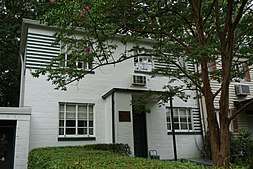
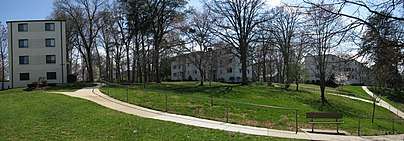
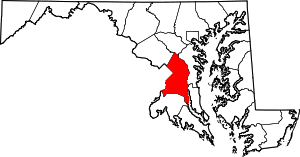
.svg.png)